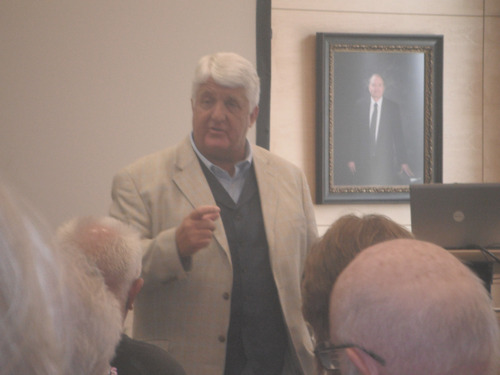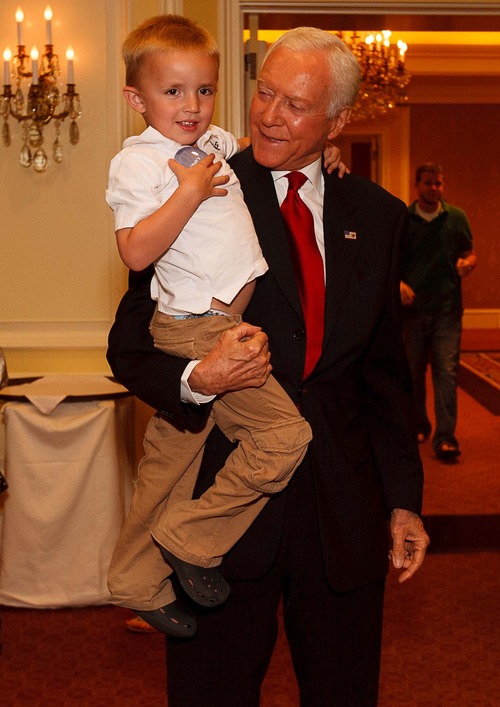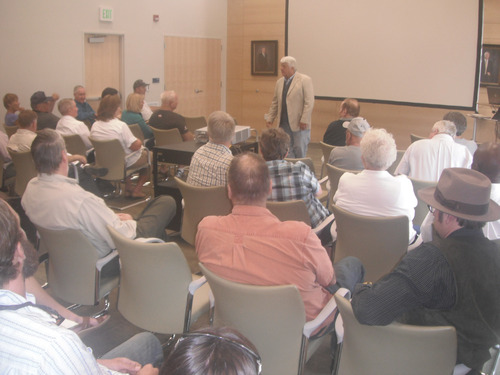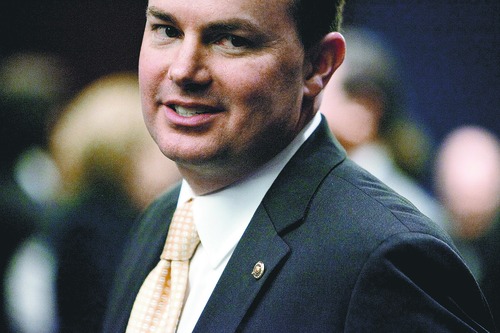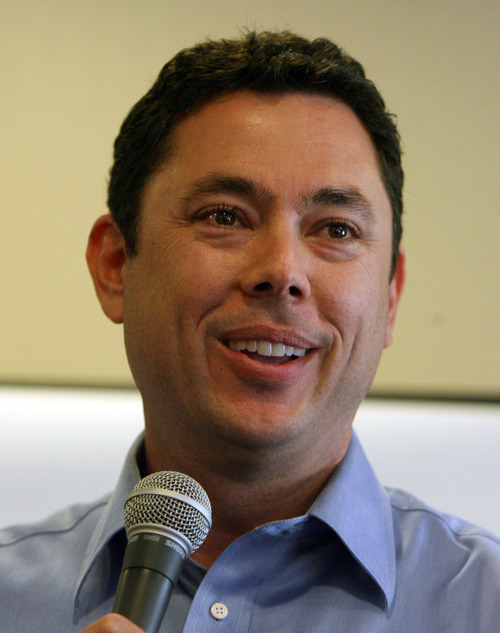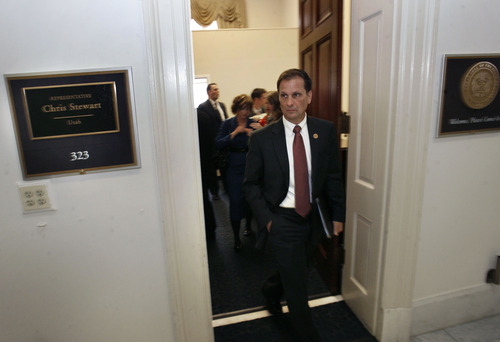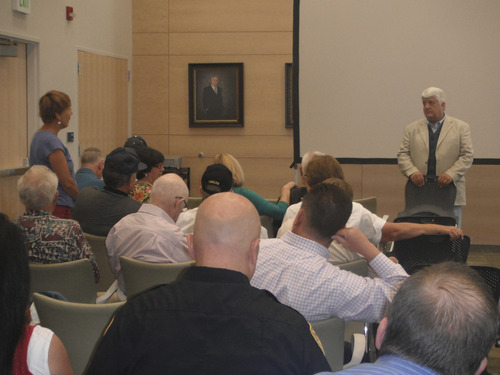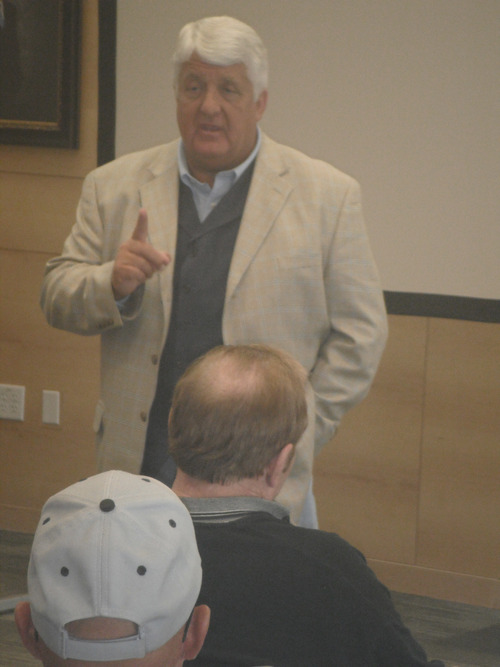This is an archived article that was published on sltrib.com in 2013, and information in the article may be outdated. It is provided only for personal research purposes and may not be reprinted.
Vernal • Rep. Rob Bishop looked at the room packed with ranchers, oil field workers, environmentalists, senior citizens and the curious and joked, "Ask me what questions you have, and I'll do my best to dodge them."
At his first town hall meeting here since eastern Utah was added to his redrawn congressional district, residents peppered the Republican over the weekend on topics from "Obamacare" to public lands, education, Social Security and pollution. One man wanted to abolish the Internal Revenue Service. Another wanted Congress to denounce homosexuality.
Then a man asked, "Why do we get so much insanity out of Washington?"
Bishop said, "Everyone back there is blowing smoke at me to try to get something." So he said it would be easy for members of Congress to lose touch with real people — except for meetings like this.
But activist groups worry that this type of town hall meeting — a longtime fixture of the traditional August recess by Congress — is disappearing, and that too many members essentially are afraid to face voters potentially upset over such hot topics as immigration reform or dismantling Obamacare.
—
Disappearing act • "We are motivating our grass-roots activists in Utah to attend town hall meetings. We are also asking them to urge their members to hold town meetings," said Chris Chmielenski, the activism director for NumbersUSA, an immigration-reduction organization, noting that Rep. Jim Matheson and Sen. Orrin Hatch have not scheduled any.
"We're afraid that members of Congress are hearing a lot from a few groups with a loud voice, but aren't hearing from the people they are actually supposed to represent in Washington. So we feel it's important for them to face their constituents in a public forum," Chmielenski said.
The conservative FreedomWorks is also urging supporters nationally to demand more town halls so they can voice support for the move by Sen. Mike Lee, R-Utah, to shut down the government if necessary to stop funding for Obamacare — and started a website to list all town hall meetings it can identify.
Announcing that drive, FreedomWorks President Matt Kibbe said, "Most members of Congress have stopped engaging constituents and defending their policy initiatives. That's the real outrage here, the inside-the-beltway resistance to a participatory process where people have a voice. ... You can go on recess, but you can't hide."
Of Utah's six members of Congress, four — all Republicans — have scheduled town halls this recess. Bishop and Chaffetz have two each. Lee planned five, but none in populous Salt Lake County. He will host them in all other Wasatch Front counties and will stream meetings on his website as well as taking questions via social media. Freshman Rep. Chris Stewart scheduled eight.
Meanwhile, a spokeswoman for Hatch, a Republican, said he is taking a break from the public sessions this year to save some money after holding many last year before his last election. But, "He still sees value in them," said Heather Barney.
—
Phone alternative • Democrat Matheson stopped holding regular town hall meetings in 2007, saying too few attended and that alternative telephone town halls reach more people more effectively. Critics say the telephone format makes it too easy to screen out tough calls in such events.
In 2009, some upset Democratic activists supporting Obamacare took their town hall to Matheson by staging a protest, complaining that no other public meetings with him were available. That year nationally, town halls devolved into shouting matches, some even breaking out in fistfights and arrests over health-care reform.
Jessica Gail, spokeswoman for Matheson, said he holds two telephone town hall meetings a month while he is in Washington, and dials up to 40,000 people each time — and thousands listen in.
Does he screen calls?
"He will take any question as long as we can understand them," Gail said. "We'll take them as long as they are not swearing on the phone. … The biggest thing is telephone town halls are easier for everyone all around."
Chaffetz, who holds both traditional and telephone town halls, said he does screen phone calls in his telephonic meetings and acknowledges that only a few of the people who queue up are able to ask questions because of time constraints.
"They are typically screened so that we get a variety" of questions, Chaffetz said. "They queue up pretty fast. We will call 20,000 to 30,000 people, and inevitably you will get 100 people queued up for calls. It's really hard to get through those."
—
Town hall value • Chaffetz has praise for traditional town hall meetings.
"If you are going to be the representative for 800,000 people, you should be able to stand there and answer questions. I get a lot out of it, and it allows the public to voice their concerns. It's what being a representative is all about."
Stewart has a similar view.
"I think people want a chance to talk to their congressman, and I want to have a chance to know what they are thinking and feeling. I just think it's an important part of democracy to have that face-to-face interaction between constituents and their leaders — maybe especially if they are really worked up."
He said it can be somewhat soothing, even to people who do not win on an issue, to at least be heard face-to-face.
"In some cases, I can't help them. In some cases, I may disagree with them. But at least they know I am giving them respect to give them that forum," he said.
"I really do enjoy them [town hall meetings] and think they are important. We have had occasions where people come to disrupt them, but those are really rare. For us, they have almost always been a positive experience," Stewart said.
Utah congressional town hall meetings
Following is a list of remaining meetings scheduled during Congress' August recess:
Rep. Rob Bishop, R-Utah •
Aug. 15: 7:30 p.m, Crossroads Center, 50 E. 200 South, Roosevelt
Rep. Chris Stewart, R-Utah •
Aug. 20: 5 p.m, Wayne County Community Center, 605 S. 350 East, Bicknell
Aug. 20: 8 p.m., Piute County Administration Building, 550 N. Main Street, Junction
Aug. 22: 6 p.m., Salt Lake City District Office, 136 E. South Temple Suite 900, Salt Lake City
Aug. 27: 5 p.m., Garfield County Building, 55 S. Main St., Panguitch
Aug. 27: 8 p.m., District Court, 76 N. Main St., Kanab
Aug. 28: 5:30 p.m., Dixie High School, 350 E. 700 South, St. George
Aug. 28: 8 p.m., Southern Utah University Alumni House, 351 W. University Blvd., Cedar City
Sept. 4: 7:30 p.m., Avenues Sweet Library, 9th avenue and F Street, Salt Lake City
Rep. Jason Chaffetz, R-Utah •
Aug. 20: 7 p.m., Museum of the San Rafael, 70 N. 100 East, Castle Dale
Aug. 21: 7 p.m., Holladay City Hall, Big Cottonwood Room, 4580 S. 2300 East
Rep. Jim Matheson, D-Utah • None
Sen. Orrin Hatch, R-Utah • None
Sen. Mike Lee, R-Utah •
Aug. 21: 7 p.m., High Chaparral Building, Spanish Fork Fairgrounds, 475 S. Main St.
Aug. 22: 7 p.m,. Plain City Senior Center, 4160 W. 2200 Nort.
Aug. 27: 7 p.m., Old Court House, 57 S. Main St., Tooele
Aug. 28: 7 p.m., Davis County Administration Building, 61 S. Main St., Farmington
Sept. 5: 7 p.m., Kanab High School, 59 E. Cowboy Drive, Kanab


